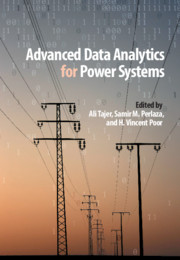Book contents
- Frontmatter
- Contents
- List of Contributors
- Preface
- Part I Statistical Learning
- Part II Data-Driven Anomaly Detection
- Part III Data Quality, Integrity, and Privacy
- Part IV Signal Processing
- 12 A Data Analytics Perspective of Fundamental Power Grid Analysis Techniques
- 13 Graph Signal Processing for the Power Grid
- 14 A Sparse Representation Approach for Anomaly Identification
- Part V Large-Scale Optimization
- Part VI Game Theory
- Index
13 - Graph Signal Processing for the Power Grid
from Part IV - Signal Processing
Published online by Cambridge University Press: 22 March 2021
- Frontmatter
- Contents
- List of Contributors
- Preface
- Part I Statistical Learning
- Part II Data-Driven Anomaly Detection
- Part III Data Quality, Integrity, and Privacy
- Part IV Signal Processing
- 12 A Data Analytics Perspective of Fundamental Power Grid Analysis Techniques
- 13 Graph Signal Processing for the Power Grid
- 14 A Sparse Representation Approach for Anomaly Identification
- Part V Large-Scale Optimization
- Part VI Game Theory
- Index
Summary
Graph Signal Processing (GSP) is a general theory, whose goal is to bring about tools for graph signals analysis that are a direct generalization of Digital Signal Processing (DSP). The goal of this chapter is understanding the graph-spectral properties of the signals, which are typically explained through the linear generative model using graph filters. Are PMU a graph signal that obeys the linear generative model prevalent in the literature? If so, what kind of graph-filter structure and excitation justifies the properties discussed already? Can we derive new strategies to sense and process these data based on GSP? By putting the link between PMU data and GSP on the right footing, we can determine to what extent GSP tools are useful, and specify how we can use the basic equations for gaining theoretical insight that support the observations.
Keywords
- Type
- Chapter
- Information
- Advanced Data Analytics for Power Systems , pp. 312 - 339Publisher: Cambridge University PressPrint publication year: 2021



